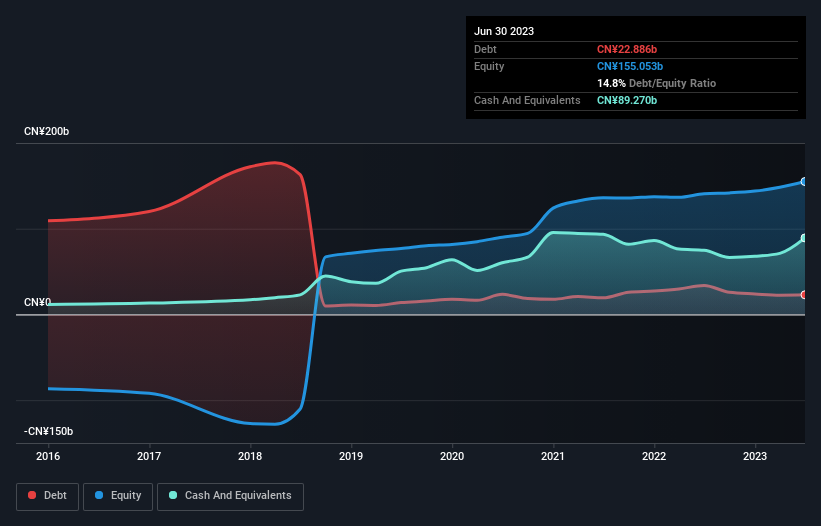
The external fund manager backed by Berkshire Hathaway's Charlie Munger, Li Lu, makes no bones about it when he says 'The biggest investment risk is not the volatility of prices, but whether you will suffer a permanent loss of capital.' So it seems the smart money knows that debt - which is usually involved in bankruptcies - is a very important factor, when you assess how risky a company is. We can see that Xiaomi Corporation (HKG:1810) does use debt in its business. But the more important question is: how much risk is that debt creating?
When Is Debt A Problem?
Debt and other liabilities become risky for a business when it cannot easily fulfill those obligations, either with free cash flow or by raising capital at an attractive price. Ultimately, if the company can't fulfill its legal obligations to repay debt, shareholders could walk away with nothing. However, a more frequent (but still costly) occurrence is where a company must issue shares at bargain-basement prices, permanently diluting shareholders, just to shore up its balance sheet. Of course, plenty of companies use debt to fund growth, without any negative consequences. When we think about a company's use of debt, we first look at cash and debt together.
View our latest analysis for Xiaomi
What Is Xiaomi's Debt?
The image below, which you can click on for greater detail, shows that Xiaomi had debt of CN¥22.9b at the end of June 2023, a reduction from CN¥33.8b over a year. However, it does have CN¥89.3b in cash offsetting this, leading to net cash of CN¥66.4b.

A Look At Xiaomi's Liabilities
The latest balance sheet data shows that Xiaomi had liabilities of CN¥94.6b due within a year, and liabilities of CN¥41.9b falling due after that. Offsetting this, it had CN¥89.3b in cash and CN¥38.2b in receivables that were due within 12 months. So it has liabilities totalling CN¥9.05b more than its cash and near-term receivables, combined.
Given Xiaomi has a humongous market capitalization of CN¥293.8b, it's hard to believe these liabilities pose much threat. However, we do think it is worth keeping an eye on its balance sheet strength, as it may change over time. Despite its noteworthy liabilities, Xiaomi boasts net cash, so it's fair to say it does not have a heavy debt load!
It is just as well that Xiaomi's load is not too heavy, because its EBIT was down 36% over the last year. Falling earnings (if the trend continues) could eventually make even modest debt quite risky. When analysing debt levels, the balance sheet is the obvious place to start. But ultimately the future profitability of the business will decide if Xiaomi can strengthen its balance sheet over time. So if you want to see what the professionals think, you might find this free report on analyst profit forecasts to be interesting.
Finally, a company can only pay off debt with cold hard cash, not accounting profits. While Xiaomi has net cash on its balance sheet, it's still worth taking a look at its ability to convert earnings before interest and tax (EBIT) to free cash flow, to help us understand how quickly it is building (or eroding) that cash balance. Over the last three years, Xiaomi recorded free cash flow worth a fulsome 86% of its EBIT, which is stronger than we'd usually expect. That positions it well to pay down debt if desirable to do so.
Summing Up
We could understand if investors are concerned about Xiaomi's liabilities, but we can be reassured by the fact it has has net cash of CN¥66.4b. The cherry on top was that in converted 86% of that EBIT to free cash flow, bringing in CN¥16b. So we are not troubled with Xiaomi's debt use. When analysing debt levels, the balance sheet is the obvious place to start. But ultimately, every company can contain risks that exist outside of the balance sheet. To that end, you should be aware of the 1 warning sign we've spotted with Xiaomi .
At the end of the day, it's often better to focus on companies that are free from net debt. You can access our special list of such companies (all with a track record of profit growth). It's free.
New: AI Stock Screener & Alerts
Our new AI Stock Screener scans the market every day to uncover opportunities.
• Dividend Powerhouses (3%+ Yield)
• Undervalued Small Caps with Insider Buying
• High growth Tech and AI Companies
Or build your own from over 50 metrics.
Have feedback on this article? Concerned about the content? Get in touch with us directly. Alternatively, email editorial-team (at) simplywallst.com.
This article by Simply Wall St is general in nature. We provide commentary based on historical data and analyst forecasts only using an unbiased methodology and our articles are not intended to be financial advice. It does not constitute a recommendation to buy or sell any stock, and does not take account of your objectives, or your financial situation. We aim to bring you long-term focused analysis driven by fundamental data. Note that our analysis may not factor in the latest price-sensitive company announcements or qualitative material. Simply Wall St has no position in any stocks mentioned.
About SEHK:1810
Xiaomi
An investment holding company, provides hardware and software services in Mainland China and internationally.
Excellent balance sheet with reasonable growth potential.

